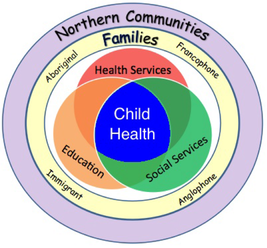|
What is CHRISP?
What is CHRISP? The Children’s Health Research Integration Stimulus Project (CHRISP) is a creative meeting process that is designed to follow a community-based participatory research paradigm in order to develop research initiatives that (from the very beginning) involve a partnership between researchers and community partners. The CHRISP is the first large-scale research initiative of the newly established ECHO Research Centre at Laurentian University in Sudbury, Ontario. There are tremendous opportunities to enhance children’s health in northeastern Ontario through research, especially within a municipality the size of Sudbury (pop. 160,000) where agencies, organizations, and institutions are in close proximity. They are often aware of one another’s work; all can be brought to the ‘table’. By bringing ECHO researchers and community partners together, the CHRISP is poised to make a difference in children’s health research within the context of northeastern Ontario. CURRENT Proposal
Current Proposal A creative series of working sessions, and lunch-in-action sessions will take place over a 1-year period. The key is to provide a process, time, space, and resources to form and sustain a research network for meaningful change in child health. The network will come together with the purpose of conceptualizing a large-scale research project and preparing a grant application to CIHR for a project that would aim to improve the resilience of children living in northeastern Ontario. The main events will be comprised of 6 half-day working sessions held bi-monthly at Laurentian University centred around a keynote speaker and 6 lunch-in-action sessions, 90-minutes in length, held bi-monthly at hosting community partners. so that eEvery month CHRISP members will meet to dialogue and move a shared research agenda forward. This schedule of monthly meetings was intentionally designed to meet the unique needs and contexts of community partners in our region. Through this process we plan on developing: 1. A new grant proposal to be submitted to the CIHR’s open operating grants competition in 2015. 2. An enriched training environment for graduate students who will have the opportunity to develop collaborations with community partners, and to consult with 6 different world-class scholars (the keynote speakers). 3. Effective knowledge dissemination and translation of research findings to community partners. 4. A sustainable and effective research network in children’s health for northern Ontario. 5. A model of community-embedded participatory research that is expected to be transferrable to other communities of similar size. Focusing on resilience in children and in youth
The main theme of CHRISP is resilience in children and youth We understand resilience as a social construct and “resilience is both the capacity of individuals to navigate their way to health-sustaining resources, including opportunities to experience feelings of well-being, and a condition of the individual’s family, community and culture to provide these health resources and experiences in culturally meaningful ways.” (Ungar 2008, 225) On February 7, 2013, ECHO hosted a ‘Child Health Research Community Consultation Session’. Over 30 individuals attended representing diverse community agencies and organizations. The main goal of the consultation session was to bring ECHO researchers together with community partners to identify the key child health research priorities in our community. Through participatory exercises and presentations, various research questions were gathered from the participants. After considering the questions and issues that arose from the consultation session, and in an attempt to include as many community partners as possible in future research projects, it was determined that the relationship between resilience and child and youth health was a convergent area of interest for most if not all of the community partners and ECHO members. In adherence to the community-based participatory research principle of ensuring that research directions reflect the priorities of the community, a web based survey was emailed to all of the consultation session participants (and other community partners who could not attend) to confirm their interest in resilience as a focus for future research. Community partners were also asked to identify what broad theme area of resilience is most convergent with their interests and mandates [physical health, mental health, or the impacts of ecosystem change on child health (ecohealth)]. The survey responses confirmed support for the focus on resilience with research interests distributed evenly across the three theme areas. |


